Related Research Articles
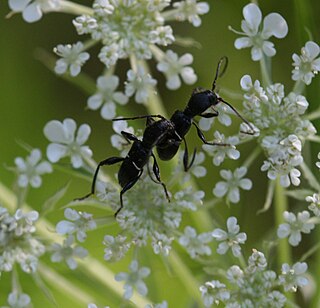
Euderces is a genus of longhorn beetles, family Cerambycidae. They are found in South, Central, and North America, with the centre of diversity in southern Mexico and Guatemala.

Lepturinae, the lepturine beetles, is a subfamily of the longhorn beetle family (Cerambycidae), containing about 150 genera worldwide. This lineage is most diverse in the Northern Hemisphere. Until recently the subfamily Necydalinae was included within the lepturines, but this has been recently recognized as a separate subfamily. Nine tribes are usually recognized today, with a tenth, Caraphiini, created in 2016. A few genera are of uncertain placement within the subfamily.
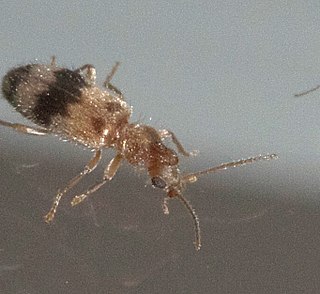
Notoxus is a large genus of beetles that resemble ants. It comprises about 300 species worldwide.

Centrodera is the genus of the Lepturinae subfamily in long-horned beetle family. Beetles of this genus are distributed in North America, most of them are found only in United States.

Brachysomida atra is the species subfamily Lepturinae in the longhorn beetle family. It was described by John Lawrence LeConte in 1850 and is distributed in Alberta, Canada, and the United States.

Xylotrechus a genus of longhorned beetles of the family Cerambycidae, containing some 200 described species.
Acanthocinini is a tribe of longhorn beetles of the subfamily Lamiinae. It was described by Blanchard in 1845.

Acanthocinus is a genus of longhorn beetles of the subfamily Lamiinae. It was described by Megerle in 1821.

Clytini is a tribe of beetles in the subfamily Cerambycinae, containing the following genera:
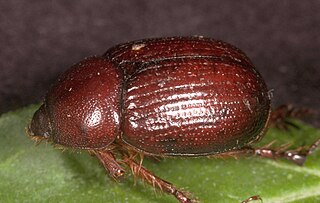
Ligyrus is a genus of beetles in the tribe Pentodontini, from the Americas. It was originally erected by Hermann Burmeister in 1847, then merged with the genus Tomarus, then restored by M.M. López-García and C. Deloya in 2022.
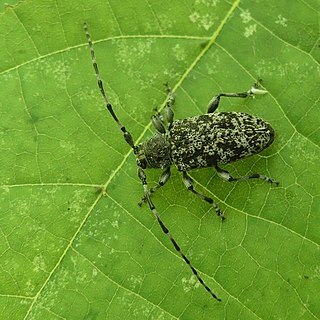
Oplosia nubila is a species of beetle in the family Cerambycidae. It was described by John Lawrence LeConte in 1862.

Synaphaeta is a monotypic beetle genus in the family Cerambycidae first described by Thomson in 1864. Its only species, Synaphaeta guexi, occurs in the Pacific states of North America, from British Columbia down to California. It has been reared from a variety of hardwood trees, including Pacific willow , white alder , coffeeberry , English walnut , and cherry . It was described by John Lawrence LeConte in 1852 based on a specimen from Benicia, California.
Eupogonius pubescens is a species of beetle in the family Cerambycidae. It was described by John Lawrence LeConte in 1873. It is known from the United States.
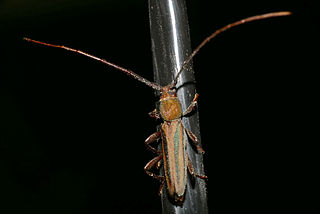
Xystrocerini is a tribe of longhorn beetles in the subfamily Cerambycinae, erected by Blanchard in 1845.

Monochamus clamator, the spotted pine sawyer, is a species of beetle in the family Cerambycidae. It was described by John Lawrence LeConte in 1852.
Batrisodes is a genus of ant-loving beetles in the family Staphylinidae. There are at least 80 described species in Batrisodes.

Lepturini is a tribe of flower longhorns in the family Cerambycidae.

Mycetophagus is a genus of hairy fungus beetles in the family Mycetophagidae. There are at least 20 described species in Mycetophagus.
References
- ↑ "Microgoes Casey, 1913". BioLib.cz. Retrieved 28 November 2018.
- ↑ "Microgoes oculatus (LeConte, 1862)". BioLib.cz. Retrieved 28 November 2018.